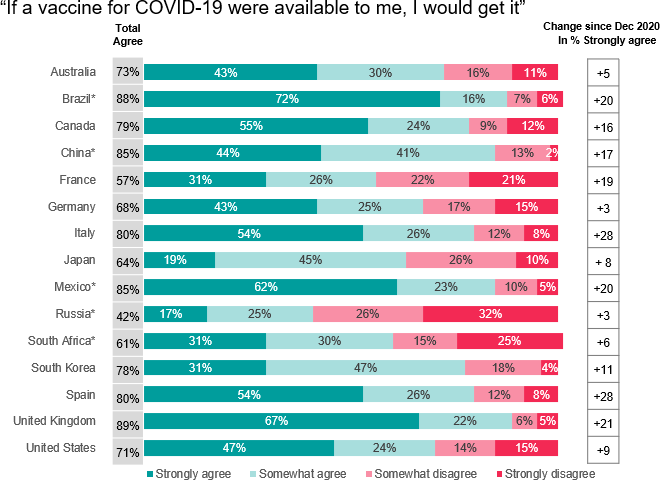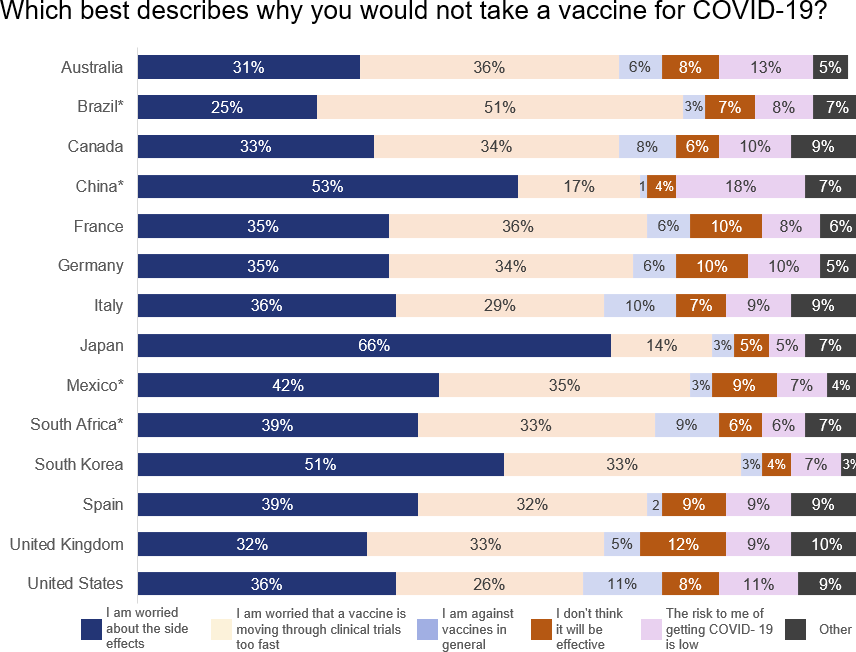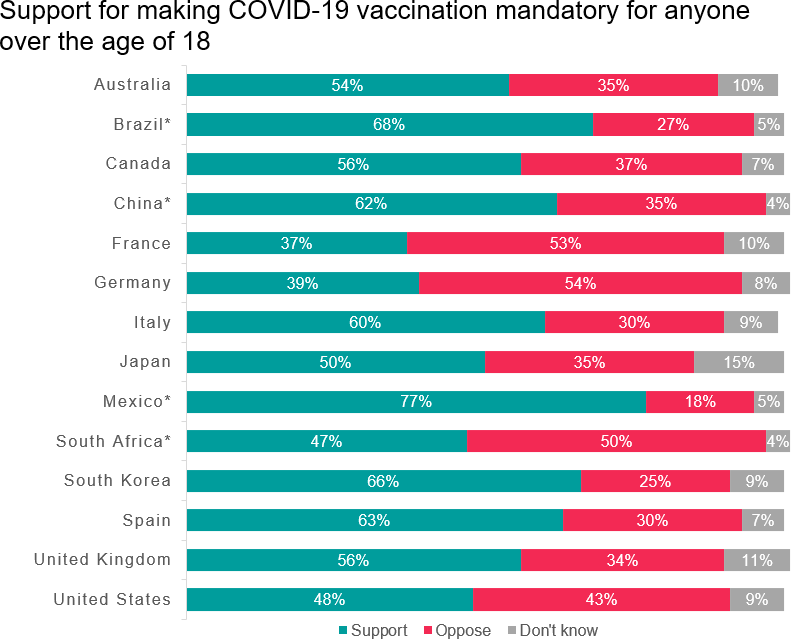- Joined
- Mar 31, 2020
- Messages
- 9,153
- Points
- 113
Global attitudes : COVID-19 vaccines
www.ipsos.com
Washington, DC, February 9, 2021 — A new Ipsos survey conducted in partnership with the World Economic Forum in 15 countries points to a general uptick in COVID-19 vaccine intent across the world, compared to six weeks ago. The global survey of adults under the age of 75, conducted on January 28-31, 2021, on Ipsos’ Global Advisor online platform, also finds:
Vaccination intent on the rise
Of all 15 countries surveyed, the United Kingdom shows the highest level of vaccination intent: Nine in ten British adults (89%) who say they have not been vaccinated against COVID-19 agree they would get a vaccine if it were available.
Among the other countries, intent to take a COVID-19 vaccine is:

In 11 of the 15 countries surveyed, most of those who agree that they will get the vaccine say they plan to do so immediately or within one month once it is available to them:
Reasons for not taking a vaccine
In nearly every country, the two main reasons for COVID-19 vaccine hesitancy are concern about the side effects and the speed of the clinical trials.

Support for mandatory COVID vaccination
Views about making COVID-19 vaccination mandatory vary across countries. Among the 14 countries where Ipsos measured opinion on making COVID-19 vaccination mandatory for anyone over the age of 18, the proposition is:

About the Study
The survey was conducted by Ipsos on its Global Advisor online platform, January 28-31, 2021, among adults 18-74 years of age in Canada, South Africa, and the United States, and 16-74 in Australia, Brazil, China (mainland), France, Germany, Italy, Japan, Mexico, Russia, South Korea, Spain, and the United Kingdom.
The samples in Australia, Canada, France, Germany, Italy, Japan, South Korea, Spain, the U.K., and the U.S. can be taken as representative of the general adult population in these countries under the age of 75. The samples in Brazil, China (mainland), Mexico, Russia, and South Africa are more urban, more educated, and/or more affluent than the general population. The survey results for these countries should be viewed as reflecting the views of the more “connected” segment of their population.
Part of the survey was conducted in all 15 countries with a base sample of 1,000+ adults in Australia, Brazil, Canada, China, France, Germany, Italy, Japan, South Korea, Spain, the U.K., and the U.S., and of 500+ adults in each of Mexico, Russia, South Africa. The other part was conducted in the same countries except Russia, with a base sample of 1,000+ adults in every country.
This document includes comparisons with data from a similar survey conducted on the Ipsos Global Advisor platform, December 17-20, 2020 with approximately 1,000 individuals in each of Australia, Brazil, Canada, China, France, Germany, Italy, Japan, South Korea, Spain, the U.K., and the U.S., and approximately 500 individuals in Mexico, Russia, and South Africa.
The data is weighted so that each country’s sample composition best reflects the demographic profile of the adult population according to the most recent census data.
Where results do not sum to 100 or the ‘difference’ appears to be +/-1 more/less than the actual, this may be due to rounding, multiple responses, or the exclusion of “don't know” or not stated responses.
The precision of Ipsos online polls is calculated using a credibility interval with a poll of N=1,000 accurate to +/-3.5 percentage points. For more information on Ipsos’ use of credibility intervals, please visit the Ipsos website.
The publication of these findings abides by local rules and regulations.
For more information on this news release, please contact:
Nicolas Boyon
Senior Vice President, Public Affairs, U.S. [email protected]
Kate Silverstein
Media Relations Specialist, Public Affairs, U.S. [email protected]
www.ipsos.com
Washington, DC, February 9, 2021 — A new Ipsos survey conducted in partnership with the World Economic Forum in 15 countries points to a general uptick in COVID-19 vaccine intent across the world, compared to six weeks ago. The global survey of adults under the age of 75, conducted on January 28-31, 2021, on Ipsos’ Global Advisor online platform, also finds:
- Widespread demand for getting vaccinated as soon as possible;
- A lack of consensus on whether the COVID-19 vaccine should be mandatory across countries; and
- Concern about the side effects and the speed of clinical trials to be the leading causes of vaccine hesitancy.
Vaccination intent on the rise
Of all 15 countries surveyed, the United Kingdom shows the highest level of vaccination intent: Nine in ten British adults (89%) who say they have not been vaccinated against COVID-19 agree they would get a vaccine if it were available.
Among the other countries, intent to take a COVID-19 vaccine is:
- Very high in Brazil (88%), China (85%), Mexico (85%), Italy (80%), Spain (80%), Canada (79%), and South Korea (78%);
- Fairly high in Australia (73%), the United States (71%), and Germany (68%);
- Middling in Japan (64%), South Africa (61%), and France (57%); and,
- Low in Russia (42%).
- Since the last survey, the highest uptick in vaccine intent is seen in Italy and Spain (by 28 percentage points to 54% who strongly agree in both countries), followed by the U.K (by 21 points to 67%), Brazil and Mexico (by 20 points in both countries to 72% and 62%, respectively), France (by 19 points to 31%), China (by 17 points to 44%), and Canada (by 16 points to 55%).
- The countries showing the smallest gains are Russia (by 3 points to 17%), Australia (5 points to 43%), and South Africa (6 points to 31%).

In 11 of the 15 countries surveyed, most of those who agree that they will get the vaccine say they plan to do so immediately or within one month once it is available to them:
- Four in five in Mexico (82%), Brazil (79%), and the U.K. (79%);
- About two in three in Spain (71%), the U.S. (70%), Germany (68%), Canada (67%), and Italy (66%);
- Over half in France (59%), Australia (56%), and South Africa (55%); but
- Fewer than half in China (49%), Japan (39%), Russia (37%), and South Korea (28%).
Reasons for not taking a vaccine
In nearly every country, the two main reasons for COVID-19 vaccine hesitancy are concern about the side effects and the speed of the clinical trials.
- Between 25% (in Brazil) and 66% (in Japan) of those who say they would not take a COVID- 19 vaccine mention being worried about the side effects.
- Between 14% (in Japan) to 51% (in Brazil) say they worry a vaccine is moving through clinical trials too fast.
- Between 5% in Japan and 18% in China think the risk they will get COVID-19 is too low.
- Between 4% (in South Korea and China) and 12% (in the U.K.) say they don’t think the vaccine will be effective.
- Between 1% in China and 11% in the U.S. are against vaccines in general.

Support for mandatory COVID vaccination
Views about making COVID-19 vaccination mandatory vary across countries. Among the 14 countries where Ipsos measured opinion on making COVID-19 vaccination mandatory for anyone over the age of 18, the proposition is:
- Supported by an outright majority in 9 countries (Mexico, Brazil, South Korea, Spain, China, Italy, Canada, the U.K., and Australia);
- Supported by a plurality in 2 countries (Japan and the U.S.);
- Opposed by a plurality in 1 country (South Africa); and
- Opposed by an outright majority in 2 countries (Germany and France).

About the Study
The survey was conducted by Ipsos on its Global Advisor online platform, January 28-31, 2021, among adults 18-74 years of age in Canada, South Africa, and the United States, and 16-74 in Australia, Brazil, China (mainland), France, Germany, Italy, Japan, Mexico, Russia, South Korea, Spain, and the United Kingdom.
The samples in Australia, Canada, France, Germany, Italy, Japan, South Korea, Spain, the U.K., and the U.S. can be taken as representative of the general adult population in these countries under the age of 75. The samples in Brazil, China (mainland), Mexico, Russia, and South Africa are more urban, more educated, and/or more affluent than the general population. The survey results for these countries should be viewed as reflecting the views of the more “connected” segment of their population.
Part of the survey was conducted in all 15 countries with a base sample of 1,000+ adults in Australia, Brazil, Canada, China, France, Germany, Italy, Japan, South Korea, Spain, the U.K., and the U.S., and of 500+ adults in each of Mexico, Russia, South Africa. The other part was conducted in the same countries except Russia, with a base sample of 1,000+ adults in every country.
This document includes comparisons with data from a similar survey conducted on the Ipsos Global Advisor platform, December 17-20, 2020 with approximately 1,000 individuals in each of Australia, Brazil, Canada, China, France, Germany, Italy, Japan, South Korea, Spain, the U.K., and the U.S., and approximately 500 individuals in Mexico, Russia, and South Africa.
The data is weighted so that each country’s sample composition best reflects the demographic profile of the adult population according to the most recent census data.
Where results do not sum to 100 or the ‘difference’ appears to be +/-1 more/less than the actual, this may be due to rounding, multiple responses, or the exclusion of “don't know” or not stated responses.
The precision of Ipsos online polls is calculated using a credibility interval with a poll of N=1,000 accurate to +/-3.5 percentage points. For more information on Ipsos’ use of credibility intervals, please visit the Ipsos website.
The publication of these findings abides by local rules and regulations.
For more information on this news release, please contact:
Nicolas Boyon
Senior Vice President, Public Affairs, U.S. [email protected]
Kate Silverstein
Media Relations Specialist, Public Affairs, U.S. [email protected]

